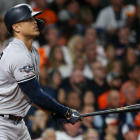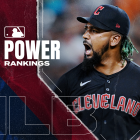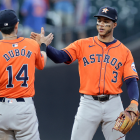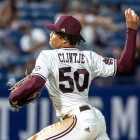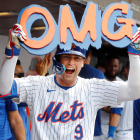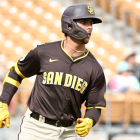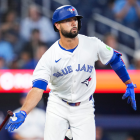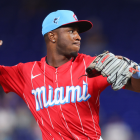HOUSTON -- Something is going on with the baseball this postseason. There are indications the ball is not traveling as much as it did during the regular season, though MLB denies it. "The only difference is the postseason stamp that is placed on the ball," the league said in a statement even though there is evidence suggesting the ball is not carrying as much.
"I guess -- I don't guess, our front office analytical group is saying the ball's not traveling at about a four-and-a-half foot difference," Cardinals manager Mike Shildt said Saturday.
Neither Yankees manager Aaron Boone nor Astros manager A.J. Hinch took the bait Saturday. When asked about the lack of carry, Hinch said he "noticed it a little bit more because elite teams are playing elite teams," then went on to list other possible reasons offense is down in the postseason. Better pitching, all the travel, shadows caused by unusual start times, etc.
"Other than when you said that I hadn't heard anything," Boone said. "So I'm going to ask our guys what we've got. There may be a couple of balls in Minnesota (in the ALDS) that seemed like maybe they could have gone a little further, whether that's the cooler weather, those kind of things, I don't know. I'm just hearing about this now. I don't know what to make of that."
After the most prolific home run regular season in history, I think we've all seen some balls this postseason that looked gone off the bat, only to watch them settle into an outfielder's glove. Aaron Judge hammered a ball to center field in ALCS Game 1 that, based on exit velocity and launch angle, goes for a hit 74 percent of the time. George Springer instead practically camped under it.
The ball is not carrying as well during the postseason as it did during the regular season. It is clear as day. We have to recalibrate our eyes as far what looks and doesn't look gone off the bat this month. The Yankees, maybe moreso than any other team, are positioned to capitalize on an "un-juiced" baseball this postseason, for two reasons.
They're giving up fewer home runs
Last year the Yankees set a record with 267 home runs hit. That record was broken by four teams this season, and I mention that here just to put in perspective how insane it is that the Yankees allowed 248 home runs in 2019. It is the eighth highest total in history -- six of the seven higher came in 2019 -- and easily a new franchise record (the previous record was 214 in 2016).
New York posted a 1.55 HR/9 during the regular season, seventh highest in baseball, and believe it or not they allowed more homers on the road (1.69 HR/9) than at cozy Yankee Stadium (1.40 HR/9). Their starting pitchers in particular were homer prone:
- CC Sabathia: 2.26 HR/9 (in postseason bullpen)
- J.A. Happ: 1.90 HR/9
- Domingo German: 1.89 HR/9 (on administrative leave)
- Masahiro Tanaka: 1.38 HR/9
- James Paxton: 1.37 HR/9
- Luis Severino: 0.00 HR/9 (did not allow a homer in 12 regular season innings after missing 5 1/2 months with injuries)
The Yankees have allowed seven runs this postseason -- they've allowed seven runs in seven separate one-run innings -- with four of the seven coming on solo homers. They've allowed as many homers in four games as the one-and-done Athletics did in the Wild Card Game. And remember, the Yankees have done that against the Twins (MLB record 307 homers in 2019) and Astros (288).
Here are the batted balls allowed by the Yankees this postseason. The Yankee Stadium ballpark overlay is imprecise, but, more importantly, you can see several long batted balls that were caught for outs or went for singles and doubles rather than home runs:
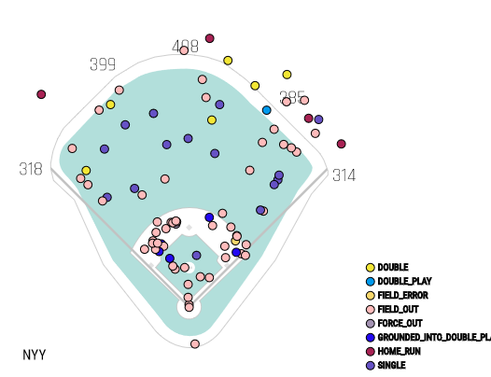
Do any of those long outs/singles/doubles go over the fence with the regular season baseball? We will never truly know for sure, but there have been several well-struck baseballs that looked gone off the bat, only to fall short. Even if the un-juiced baseball equals only one or two fewer homers allowed in October, it can made a huge difference for the Yankees. It can change a series.
They can still hit the ball out of the park
The Yankees are the exit velocity kings. Their team 89.7 mph average exit velocity was the best in MLB during the regular season, and they fielded six players who averaged 90 mph or better (min. 100 batted balls). Not among them is Giancarlo Stanton, who was limited to 18 games by injuries but still smoked the ball when healthy. He always ranks near the top of the exit velocity leaderboard.
In Game 1 of the ALCS on Saturday, Stanton sent a rocket solo home run the other way into the Astros bullpen. It left his bat at 100.7 mph and it was not even the hardest hit ball by a Yankee this postseason. Judge and Edwin Encarnacion have both topped that number. That doesn't make Stanton's homer any less impressive, of course.
Encarnacion, Judge, Stanton, and Gary Sanchez all posses the kind of power that makes the un-juiced baseball moot. The can still go deep to any part of the park at any time. They're that strong. The average power hitters, the guys who went from 10-15 homers to 25-plus homers this year, like Brett Gardner and DJ LeMahieu, are most impacted by the juiced ball. Not the big mashers.
With home runs suddenly being harder to hit, power is again at a premium, and that's makes players like Judge, Stanton, et al. that much more valuable in October. No longer is the defensive wiz on the infield or the fourth outfielder hitting 18-plus home runs, you know? The Yankees have the power that will play anywhere, juiced ball or no juiced ball. They're still going to hit their homers.
Home runs and apparent changes to the baseball are the single biggest story in baseball this season. The possibility that the ball is different in the postseason than it was during the regular season is unfortunate at best and suspicious at worst, especially since we are in the era of MLB having an "official gaming partner" in MGM. Whatever it is, the ball does not seem to be carrying in October.
The Yankees are uniquely positioned to benefit from what might be an un-juiced baseball. They have power hitters who don't need the juiced ball to go deep -- GM Brian Cashman has long called them the team's "big hairy monsters" -- and their home run prone pitching staff might be better able to keep the ball in the park. New York's weakness has been mitigated without compromising their strength to the same degree.









